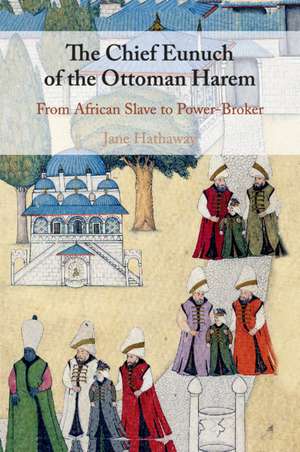The Chief Eunuch of the Ottoman Harem: From African Slave to Power-Broker
Autor Jane Hathawayen Limba Engleză Paperback – 25 mar 2020
| Toate formatele și edițiile | Preț | Express |
|---|---|---|
| Paperback (1) | 287.87 lei 6-8 săpt. | |
| Cambridge University Press – 25 mar 2020 | 287.87 lei 6-8 săpt. | |
| Hardback (1) | 699.71 lei 6-8 săpt. | |
| Cambridge University Press – 29 aug 2018 | 699.71 lei 6-8 săpt. |
Preț: 287.87 lei
Nou
Puncte Express: 432
Preț estimativ în valută:
55.08€ • 57.67$ • 45.58£
55.08€ • 57.67$ • 45.58£
Carte tipărită la comandă
Livrare economică 05-19 aprilie
Preluare comenzi: 021 569.72.76
Specificații
ISBN-13: 9781107519206
ISBN-10: 1107519209
Pagini: 339
Ilustrații: 27 b/w illus. 6 maps 6 tables
Dimensiuni: 152 x 229 x 19 mm
Greutate: 0.45 kg
Editura: Cambridge University Press
Colecția Cambridge University Press
Locul publicării:New York, United States
ISBN-10: 1107519209
Pagini: 339
Ilustrații: 27 b/w illus. 6 maps 6 tables
Dimensiuni: 152 x 229 x 19 mm
Greutate: 0.45 kg
Editura: Cambridge University Press
Colecția Cambridge University Press
Locul publicării:New York, United States
Cuprins
1. Introduction to the Chief Harem Eunuch; 2. The African Connection; 3. Arrangement in black and white: eunuchs in the Ottoman Palace; 4. The creation of the office of Chief Harem Eunuch and the career of Habeshi Mehmed Agha; 5. The crisis years of the seventeenth century; 6. Yusuf Agha and the Köprülü reforms; 7. A new paradigm: El-Hajj Beshir Agha and his successors; 8. Exile and the Kingdom: the Chief Harem Eunuch and Egypt; 9. The Chief Harem Eunuch and Ottoman religious and intellectual life; 10. Reformed out of existence: the dénouement of the Chief Harem Eunuch; 11. Memorializing the Chief Harem Eunuch; 12. Conclusion.
Recenzii
'Building on an impressive body of work on Ottoman Egypt and the Arab lands, and on the formidable early eighteenth-century Chief Harem Eunuch el-Hajj Beşir Agha, Jane Hathaway focuses here on the careers of these eunuchs and how the office evolved over time. She deftly brings her subjects out of the shadows to reveal the geographic and functional reach of their interests, which oscillated between the poles of Istanbul and Cairo, but also extended from guardianship of the Prophet's tomb to protection of the grain trade on the Danube. Hathaway has written a work with a strong narrative thread that is at once scholarly and accessible. Her careful research allows the Chief Harem Eunuchs to take their place in the constellation of Ottoman power and demonstrates that, as she writes,'the imperial household could not function without eunuchs, and vice versa'.' Caroline Finkel, author of Osman's Dream: The Story of the Ottoman Empire
'Long accustomed to despise palace intrigues and the people that used to spin them in the past, we usually prefer to forget the enormous role that 'the backstairs of power' play in our own time. Now Jane Hathaway's wide-ranging and fascinating account shows how eunuchs from East Africa came into the Ottoman palace and how sultans and courtiers elevated or destroyed them for reasons of their own. This study portrays these men as real people, trying to make a place for themselves in an unfamiliar world, to which they had not come of their own volition. Hathaway shows how by clever alliance-building, piety and charity these men attempted to overcome the opprobrium that in Ottoman society (as elsewhere), clung to them as people not fully men and yet not women.' Suraiya Faroqhi, University of Munich
'The first book-length account of the black eunuchs of the Ottoman sultanate, Hathaway's study deftly weaves the Istanbul and Egyptian power bases of the Chief Harem Eunuch's office into a riveting story of rise through the seventeenth and eighteenth centuries and then irrelevance in the reform era of the nineteenth. Individual figures come vibrantly alive, some rivaling the grand vizier in influence. Particularly novel is a chapter on memorializing of the Harem eunuchs through painted images, tombs, and gravestones.' Leslie P. Peirce, New York University
'Jane Hathaway's The Chief Eunuch of the Ottoman Harem is as full a picture of African eunuchs in Mediterranean history as readers are likely to find, or construct for themselves.' Madeline C. Zilfi, Journal of the American Oriental Society
'Long accustomed to despise palace intrigues and the people that used to spin them in the past, we usually prefer to forget the enormous role that 'the backstairs of power' play in our own time. Now Jane Hathaway's wide-ranging and fascinating account shows how eunuchs from East Africa came into the Ottoman palace and how sultans and courtiers elevated or destroyed them for reasons of their own. This study portrays these men as real people, trying to make a place for themselves in an unfamiliar world, to which they had not come of their own volition. Hathaway shows how by clever alliance-building, piety and charity these men attempted to overcome the opprobrium that in Ottoman society (as elsewhere), clung to them as people not fully men and yet not women.' Suraiya Faroqhi, University of Munich
'The first book-length account of the black eunuchs of the Ottoman sultanate, Hathaway's study deftly weaves the Istanbul and Egyptian power bases of the Chief Harem Eunuch's office into a riveting story of rise through the seventeenth and eighteenth centuries and then irrelevance in the reform era of the nineteenth. Individual figures come vibrantly alive, some rivaling the grand vizier in influence. Particularly novel is a chapter on memorializing of the Harem eunuchs through painted images, tombs, and gravestones.' Leslie P. Peirce, New York University
'Jane Hathaway's The Chief Eunuch of the Ottoman Harem is as full a picture of African eunuchs in Mediterranean history as readers are likely to find, or construct for themselves.' Madeline C. Zilfi, Journal of the American Oriental Society
Notă biografică
Descriere
A study of the chief of the African eunuchs who guarded the sultan's harem in Istanbul under the Ottoman Empire.
